If you walk into a room and suddenly
- the energy changes
- people avoid your personal space
- all of a sudden it gets quiet
then we’ve got some work to do.
As a recovering annoying person, I’ve learned that being called annoying leads to sadness, resentment, and a whole lot of empty ice cream containers.
My goal is to help you become aware of your annoying behavior so you can become a more tolerable—and even socially savvy—human being!
So let’s dive in, starting with…
Am I Annoying?
Many annoying people don’t even realize they’re being annoying in the first place. Annoying people might violate various social norms, be incompatible with others, try too hard to make others laugh, or even take a phone call while in a quiet library.
Did you know that you could even be the “irritating person” because you’re too positive?
This type of positivity is known as toxic positivity—and it’s a real thing.
Check out more of these signs to see if you’re annoying:
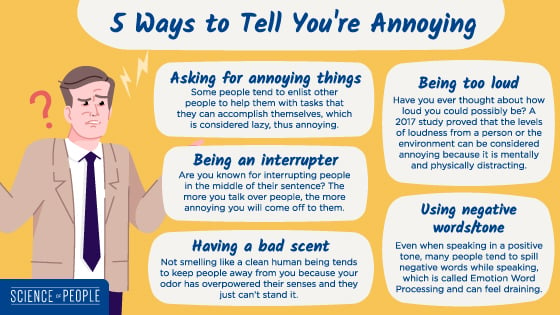
- You ask annoying questions: Some people tend to enlist other people to help them with tasks that they can accomplish themselves, which makes them come off as lazy, and thus annoying. For example, if you’re that one guy always asking your friend at school for lunch money because you forgot yours, you probably need to step up your game.
- You’re too loud: Have you ever thought about how loud you could possibly be? A 2017 study proved that the level of loudness of a person or the environment can be considered annoying because it is mentally and physically distracting. Believe it or not, this tip isn’t only for elderly folks—you probably know someone who yells like a soccer coach even though you’re an arm’s length away.
- You’re an interrupter: Are you known for interrupting people in the middle of a sentence because a thought popped into your head and you have to express it now?! Well, the more you talk over people, the more annoying you will come off to them.
- You lack good hygiene: Not smelling like a clean human being tends to keep people away from you because your odor has overpowered their senses and they just can’t stand it. Now, I understand some people have natural odors, but you can try to avoid foul scents at all costs. Foul scents can include using strong perfumes or colognes, not wearing deodorant, and, of course, having bad breath and personal hygiene.
- You talk negatively: Even when speaking in a positive tone, many people tend to spill negative words while speaking, which is called emotion word processing and can feel draining. For example, your boss might ask you, “How’s your day?” and you might blurt out something like, “Oh, it’s been great! Except for this terrible weather and these dumb clients.” This will surely keep a person from talking to you or wanting to be around you.
Of course, there are so many reasons why someone might find you annoying (we’ll cover that later). Other factors like bad humor, speaking in run-on sentences without taking a break, and constantly being toxic can also add to your potential annoyance factor.
Ready to level-up your life? Watch our video below to learn how to create your own professional development plan:
So to find out if you’re REALLY annoying, let’s move on to the quiz.
The “Am I Annoying?” Quiz
Here are five simple questions that will help you determine how annoying you are!
Are you brave enough to take this quiz? Then brace yourself for what’s to come and let’s see how irritating you can be!
1) You text your crush frequently, but one night they stop responding all of a sudden! You figure it has to do with a potentially sensitive question you asked them about earlier. What do you do next?
- try to catch them next time in person
- keep texting them and bringing up the question, hoping that they will text you back
- relax and give them a day or two to breathe
- start texting someone else
If you keep texting someone after they stop responding to your messages, that will make you bothersome… especially if you’re bringing up a bad topic. So if you chose “B,” take the lack of communication as a sign of annoyance.
2) How often do you complain about your problems or other people’s problems?
- more than I’d like to
- once a week
- only when I’m asked about them
- when I’m with a counselor
Complaining is one of the quickest ways to get someone to think, You are so annoying! If you chose “A,” people might avoid you because they view you as a burden to hang around.
3) Let’s say you’re at work and trying to find out why there are so many refunds on your product. Your coworker gives you a handful of possible reasons and advice on how to fix the problem, but you think they are wrong. How do you respond?
- take their advice and apply it
- discuss more realistic options
- say “Thank you” and test it out
- bluntly tell them why none of the solutions will work
If you chose “D,” you might be a bit more aggressive at work than your coworkers might like. People may find you annoying if you’re constantly asserting your own opinion but not taking others’ opinions into account.
4) Imagine you’re at a party or networking event and you meet someone new. What do you talk about?
- myself
- them
- a totally random topic
- an interesting conversation starter
If you chose “A,” people might find you too self-absorbed and more annoying. As Dale Carnegie once said, “A person’s name is to that person the sweetest, most important sound in any language.” If you chose “C,” you might be annoying—depending on what topic you pick!
5) Your friends make a joke about you and everyone laughs. How do you react?
- I laugh with them
- I make a joke back at them
- I may get upset because I don’t like being picked on
- my friends would never make a joke about me
Friends and family members may joke around with those they feel comfortable with. Selecting “C” indicates that you could be the hypersensitive friend people don’t like to joke around.
So how did you do?
Here’s your “Am I Annoying?” quiz score!
- 1 = 20%
- 2 = 40%
- 3 = 60%
- 4 = 80%
- 5 = 100%
Score yourself by tallying your answers. If you chose at least 3 out of 5 “annoying” answers, unfortunately, people might think you’re annoying.
Try asking someone you know, “I want your honest opinion—no need to shy away from the truth. Do you think I am annoying or could be annoying to others?” and see what they say… or don’t say.
Here’s a hint: The longer they hesitate, the more annoying they find you.
6 Ways To Stop Being Annoying, From a Recovering Annoying Person
As a recovering annoying person, I know how difficult it is to kick the can and be someone others want to hang around.
Here are my 6 best tips and tricks for you to finally get rid of that annoyance trait forever and unleash the amazing person you really are!
Put on a big smile
Works well for: people who seem to lack engagement
Research shows that smiling is mostly based on social cues of engagement.
In other words…
The more you smile, the more people find you engaged in the conversation!
Furthermore, we tend to associate smiling people with positive qualities too (i.e., non-annoying!).
By showing those pearly whites, you will show engagement and be seen as less annoying!
Total win.
Special note: If something bad has happened or you are in a negative situation, your face should match the mood! Don’t smile at someone’s bad news.
Use the “ask or tell” technique
Works well for: people who are bad at conversations
People can tell when you aren’t paying attention because you either have no feedback to give them or you instantly change the subject to something totally different.
Let’s change that using the “ask or tell” technique.
Whenever you’re in a conversation and the other person says something, simply bounce off of what they said by saying something related to that topic.
For example, if you’re at a networking event and they bring up their restaurant business, you could:
- Ask: Bring up a question about their restaurant. It could be how long they’ve been open, if they like being in the business, what kind of food they make, what got them started, where they are located, who they work with, if they’ve run any other businesses, their own favorite restaurant, and more!
- Tell: Tell them something related to the restaurant or business in general, such as your own history of businesses, that one time you almost started a restaurant, a TV show about restaurant businesses, the importance of owning a business, a striking statistic about restaurants or other businesses—literally anything you can think of!
Pro Tip: Talk too much about yourself? Focus on the “ask” part. Shift all of your attention to the speaker and provide feedback and questions that keep the conversation on them and their topic.
Bonus: Become more likable
Let’s face it: if people find you annoying, you probably aren’t the most likable person in the room. However, being likable is like a science. And the more you know about how to be likable, the easier it is for people to like you. Check out our best resource on likability:
Be The Most Likable Person In The Room
Learn the skills we’ve taught 500k+ students to become more charismatic and successful — including:
- 💝 5 phrases that will make you instantly more likable
- 🤯 Our secret likability strategy for introverts
- 💬 The #1 trick to never running out of things to say
Play angel’s advocate
Works well for: people who like to be right
If you’re used to playing devil’s advocate, I want you to play angel’s advocate instead.
In other words, be the person who accepts others’ ideas. This doesn’t mean their ideas are right or you necessarily agree with them—this just means you accept they have those ideas.
Let’s say you’re at work and your coworker comes over and talks about how a home entertainment system was the best purchase of his life—even though he took out a loan to pay for it. You, being the financially savvy individual you are, know deep down that’s a terrible idea.
But he keeps saying you should get one. So what do you do?
Play angel’s advocate—and say something like, “Yeah! That sounds absolutely amazing. I’ll keep it on my radar.”
The point of playing angel’s advocate is to hear people out.
Perhaps your coworker wants the best for you. Or perhaps he is having second guesses about his purchase and just needs validation that what he did was right.
Either way, playing angel’s advocate definitely nets you social brownie points!
Let it go
Works well for: people who like to micromanage
Although we’re not talking about the Disney movie here, letting it go is an important concept to embrace if you’re always checking up on people.
Sure, you might think you’re doing good.
But are you really causing your coworkers a lot of unnecessary stress and mental anguish?
Instead of checking in with your employees or friends on what they’re doing every single day, let the clockwork run itself.
Good managers know how to run a business—great managers know how to let it run itself.
Whether it’s a weekly team call or a week-by-week email breakdown, let them give you updates instead of chasing after them yourself.
Master social energy
Works well for: people who are bad at social cues
If you’ve ever “felt” a room full of people and the vibe they were giving off, you’ve probably felt what’s known as social energy.
Social energy is the vibe or “feeling” you get when you enter a room full of people. The social energy in the room can be exciting and upbeat (like at a party) or more mellow and laid-back (like at a friend’s house).
To put it into more scientific terms, you can think of social energy as the collective nonverbal and verbal qualities of all the individuals in the room.
People are said to be harmonious and look like they belong together because their nonverbal and verbal behaviors match. So if you’re in a group and you’re labeled the “odd” or “annoying” one, chances are you’re not blending in.
It’s important to match the energy in the room so that you can easily fit in with your friends and amplify the peace instead of disturbing it.
Here’s how:
- Identify the social energy in the room. Is the social energy more warm and friendly? Or is it professional and cool? Truly charismatic people can change the social energy of a group fairly easily—however, if you’re just starting out, try to blend in. Notice the group’s body language and the way they talk for hints.
- Identify a few “key cues.” These cues might be the way they stand (straight, leaning on one leg, with their torso turned to the side), the way they dress (professional, informal, with certain colors), or even how they use their hand gestures.
- Copy their cues. Try to emulate them subtly. Mirror their behavior and see what happens. Does it change anything? Do they find you more tolerable and less annoying?
Remember, your goal isn’t just to copy them, but rather to see what works. You may even want to ask a close friend to observe how you act around a specific group of people to see how you stand out.
Once you’ve identified what works, master the social energy!
Increase the positivity
Works well for: people who are overly negative
It sounds cliché, but it helps to stay positive.
If you find yourself always complaining about work, your relationships, or life in general, it’s time to put on your positivity party hat:
- Be grateful. One study proves that being grateful works—“Gratitude blocks toxic emotions, such as envy, resentment, regret, and depression, which can destroy our happiness.” You’ve heard it before, but tally up a few things you’re grateful for every day. Write them down or share them with your partner and you’ll literally combat your negative thoughts.
- Change your negative pilot. We all have a pilot in our heads that controls our thoughts, whether they’re positive or negative. Throughout your day, catch yourself thinking negative thoughts and immediately replace them with positive ones. It might help if you carry around a “tip jar” of some sort and donate a bill every time you catch yourself thinking negatively.
- Change your tunes. Do you consume negative music? What about negative news? Negative movies and TV shows? Do a complete negative detox by replacing the negative sources with positive ones.
- Make eye contact. Do you walk down the street like you’re Batman looking for the Joker? Try making friendly eye contact with others. Don’t mind their reactions if you “think” they’re negative, and try to see the positivity in others.
Pro Tip: Don’t be too positive… or you might cross the line into toxic positivity (remember how we talked about that earlier?). If you’re confused about how much positivity is too much, head on over to our article: Toxic Positivity: Why Positive Vibes are Ruining You
Why Am I So Annoying?
You’ll be happy to know that there are some practical reasons why you are annoying to others and why you can even get annoyed with yourself.
Let’s take a look, superpower-style:
- You’ve got anxiety
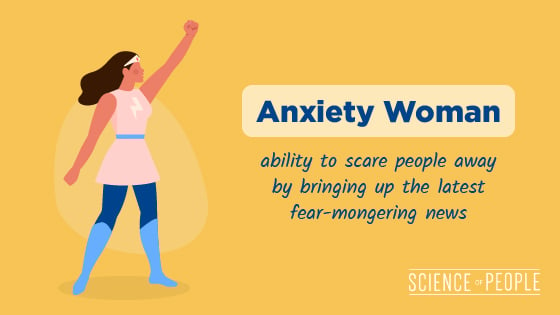
With all the options that we have in the world, people tend to become overwhelmed by them while deciding what they want. This process, although it may seem simple, can be a challenge for many people and cause them anxiety.
We’ve all been there before.
Do you have anxiety at random times or constantly start statements with the phrase “Oh, my anxiety…”?
Approximately 28.8% of adults in the United States suffer from some degree of anxiety, and it can hinder both your potential for personal growth AND your capacity for patience.
A lack of patience due to anxiety can lead to complaining, a negative tone, and an irritating attitude.
Ask yourself if you’d want to be around a person like this.
If the answer is no and this shoe fits your foot, you now have more insight into why someone may find you annoying.
You lack positive emotions
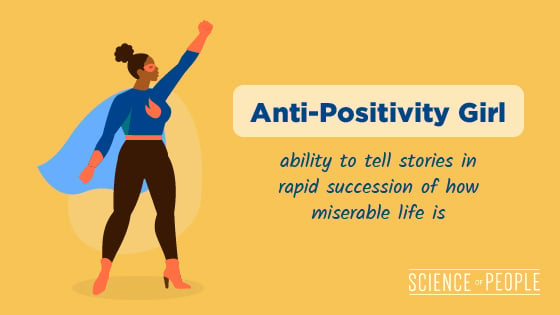
I mentioned this earlier, but your lack of positivity could also be why your friends find reasons not to come over and hang out with you.
Lacking positive emotions leads to deeper negative actions like yelling, passive-aggressiveness, or excessive complaining, which make you come off as “unfriendly.”
You’ve got warped perception
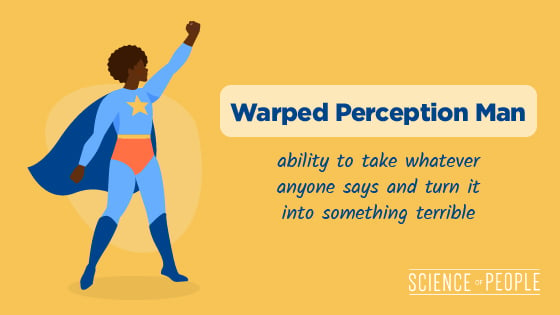
There is a likely chance that you are not annoying; you simply think you are based on other factors like instant gratification, dismissal, or self-esteem.
For example, let’s say you ask for help with a work project and your coworker says, “No problem,” but they never return to assist you.
So… what happened!?
You could feel as if your associate didn’t come back because they didn’t want to be bothered with you, which may lead to a spiral of negative self-talk.
But the reality might have been that they were just busy and forgot.
Pro Tip: Give yourself and others the benefit of the doubt. Get rid of thoughts like “They hate me!” and “I knew my coworker’s a backstabber.” Replace your negative thoughts with positive ones and watch your spirits rise again!
Pro Tip #2: Focus on the reason they left and the words they use instead of your interpretation of them.
Pro Tip #3: If you’re suffering from low self-esteem, remind yourself of your personal progress three times per day. Use positive affirmations correctly to boost your self-esteem, and try going on a digital detox to boost that long-lost dopamine!
Is It Bad to Ask If I’m Annoying?
Not at all. It is deemed appropriate to ask someone if you’re annoying as it shows your higher level of maturity and awareness. It also indicates that you respect their boundaries and hold them in high regard even if you feel embarrassed for taking the risk to ask.
However, here’s what you should remember: Only ask “Am I annoying?” once. The irony here is that even if you really want to find out more, the more you ask, the more annoying you become!
How Do You Tell If Someone Is Annoyed by You?
OK, so you want to tell if someone is really annoyed by you?
Here are the telltale signs to look out for:
1. Body Language
Several types of body language are used to express non-interest or boredom in a situation, inevitably leading to showcasing negative feelings with the body.
Body language that indicates someone is finding you annoying can be
- Folding their arms across their chest. This is a typical body language cue that signals someone closing themselves off from you. We typically do this if we want to protect ourselves—whether physically or just from another person’s presence!
- Clenching their jaw. Jaw clenching is a typical anger microexpression and is often seen before someone gets into a fight. This doesn’t mean you’re going to fight, but it’s a common sign someone is getting upset and potentially annoyed.
- Furrowing their brow. Much like the above cue, furrowed brows also show anger and are characteristic of the “angry eyes” look. Take notice if you ever see someone suddenly furrowing their brow.
- Avoiding eye contact. This is a typical avoidance cue that signals “I don’t want to see you!” If you know they tend to make eye contact a lot but are avoiding you for some reason, this could mean they want you gone.
- Sighing impatiently. Although it is unintentional (most of the time), sighing is a sign of distress or anxiety and can signal other negative emotions, such as despair. When you see this happening, just know it’s time to stop what you’re doing and let them move on to their next endeavor.
- Engaging in self-distraction. Remember being in school with that history teacher who sounded as exciting as pink-colored chalk, and you drew just to keep yourself awake? That’s self-distraction, and it’s a common way people deal with being around annoying people while trying to be polite. Forms of self-distraction can include playing with their hands, chewing gum, or even scratching their head.
Special note: Seeing only one of these cues does not necessarily mean you are annoying, but if you see several of them every time you are around someone, try to dig deeper to find out why.
Of course, there are a lot more cues to keep in mind. Head on over to our body language guide for a comprehensive list of cues!
2. Constant Agreement
Have you ever been conversing with someone so much that they simply “yes” you to death by agreeing with everything you say?
Well, it could be because you’re right 100% of the time… or they think if they agree with you, you’ll eventually stop talking.
If you see them always in a hurry around you but not others, or if they’re always making excuses like their dog ate the carpet (again), then something might not be working.
3. Abruptly Leaving
When the irritation builds up and the excuses don’t work, abruptly leaving you where you stand is the final signal that someone is annoyed with you.
Unfortunately, this action only happens when you haven’t taken the other hints that they want to leave, so they take matters into their own hands at the risk of upsetting or embarrassing you.
How Do You Know If You’re Annoying Someone Online?
You know if you’re annoying someone online if they take these digital actions:
- they suddenly “have to go” or their “internet is having problems” while on a Zoom call
- they keep pushing your next meeting to later, and later, and later…
- you get blocked or unfriended
- you create a new account to message them, only to get blocked or unfriended again
- people type at you with ALL CAPS and use exclamation marks (!!!), but you think that means they are excited
- mean or derogatory emojis are used toward you
- they say they want to meet up but end up ghosting you
Bonus Tip #7: Find Your Tribe
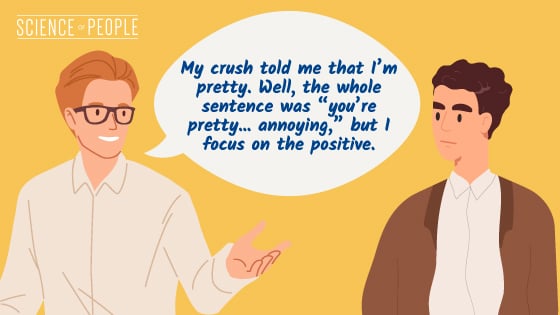
Here’s the thing: Some people might find you annoying, and maybe that’s good. Not everyone is going to be your person.
Find your own tribe of people who love you for who you are—easier said than done, but here is an excellent actionable article to get you started: Post Pandemic Friendships: How to Overcome Bad Social Skills.
